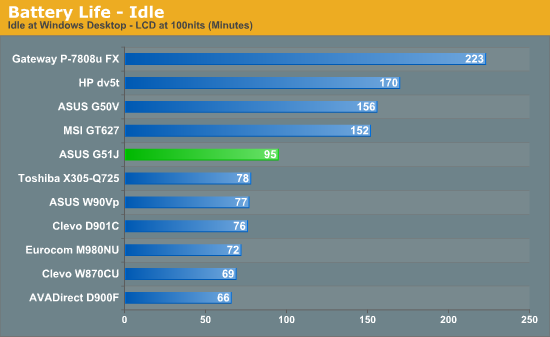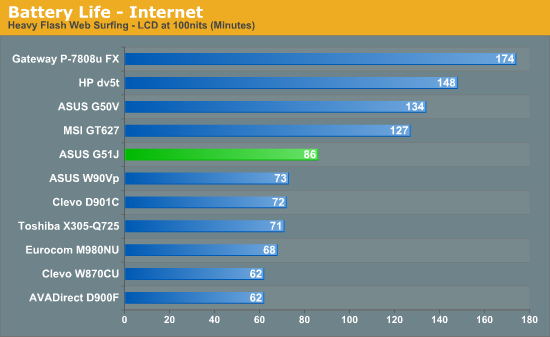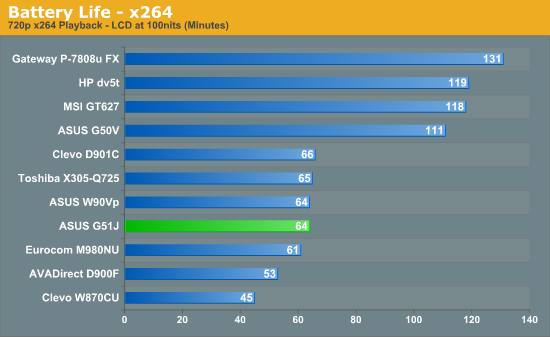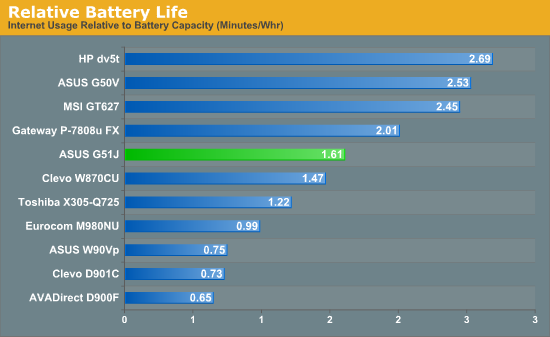ASUS UL80Vt and G51J: Going for the Gold
by Jarred Walton on December 15, 2009 1:30 AM EST- Posted in
- Laptops
ASUS G51J Battery Life




Obviously, battery life on any gaming laptop isn't going to be anything special. The G51J does manage to surpass the W870CU by an average of 40%, but then the G51J also has a higher capacity battery. In our relative battery life metric, the lower performance i7-720QM and GTX 260M look like they improve battery life by around 15%. (Note that the G51J has two hard drives compared to a single SSD in the W870CU, so we're factoring that in.)
Best-case scenario we still only manage 97 minutes of idle battery life with the G51J - and that's with CPU performance set to the most conservative values. If you want to have some fun and play a 3D shooter while on battery power, you're looking at around 40 minutes before you need to plug in. Of course, it's a little ironic that the UL80Vt has a higher capacity battery than the G51J; shouldn't power hungry systems get big batteries as well? We like the 84Wh battery in the UL80Vt, no doubt, but the same battery could have helped the G51J achieve over 2 hours of battery power in the Internet test.










66 Comments
View All Comments
whatthehey - Tuesday, December 15, 2009 - link
Thanks for that; now go blow more smoke up Jobs' arse and leave the real discussion to people that can think.Calling this a cheapo Asus to try and make you Mac look better is pathetic. What makes it cheap, other than a plastic body? Most laptops are plastic shells, and this is still $40 less than the plastic MacBook while offering superior battery life and gaming performance. Plus I wouldn't have to put up with OS X and its quirks. Anand may love that stuff but I'd just as soon stick with Windows. No contest over glorified Apple.
KutterMax - Tuesday, December 15, 2009 - link
Congratz to ASUS for the UL80Vt which looks to be a very nice portable machine that still has some pretty reasonable gaming performance coupled with great battery life.ASUS has made some great computers. I picked up a "Lamborghini" a few years back and still really like it. However the very short battery life and heft did not make it the best travel companion.
I recently picked up a new Sony Z-series with a 2.8GHz processer, a couple extended batteries, and built-in Bluray. Granted it wasn't cheap, but the laptop is pretty slick. Sony allow put a great display on it and Blurays look outstanding. Importantly - it plays Torchlight great...
Basilisk - Tuesday, December 15, 2009 - link
"... if you're talking a difference of 10W to 14W, that's a 40% increase in power requirements - or 40% less battery life."I believe the correct statement is "29% less run-time":
RT = Wh / w ; RT reduction = 100% * (1-10w/14w) = 28.6%
By analogy, your metrics would suggest a 100% loss in run time (= zero time) if the draw was 20 watts, whereas its actually a 50% reduction.
JarredWalton - Tuesday, December 15, 2009 - link
Sorry... was being lazy when I wrote that. It would mean the lower power gets 40% more battery life, but as you point out the higher power draw is 29% less battery life.Wolfpup - Tuesday, December 15, 2009 - link
Notebookreview's forums have reported major stability issues with that specific model:http://forum.notebookreview.com/showthread.php?t=4...">http://forum.notebookreview.com/showthread.php?t=4...
That's really uncommon for Asus laptops, but seems to be the norm for this model, so...I take it the review unit didn't have those issues?
I run Folding @ Home on both my CPU and GPU when I'm not gaming or watching Blu Rays, so one way or another my hardware's always getting hit hard...need it to be 100% stable.
Also, regarding Vista or 7 losing power settings, I've never had that happen, though I always use "always on" and always do a clean install of the OS (I wasn't running much Asus software on my N80nv on Vista, and didn't install any under 7).
JarredWalton - Tuesday, December 15, 2009 - link
I didn't have any stability issues with the G51J during testing. That said, I highly caution against running Folding@Home (SMP or GPU) on a laptop. I used to do that and found that it seemed to cause serious problems after 6 months or so... that it just pushed the hardware beyond where it was intended. I sometimes wonder if all the "failing NVIDIA mobile GPUs" isn't somehow related to a lot of people running such apps, but that's probably oversimplified.In short, while I respect what the Folding teams are doing, I've determined that intentionally stressing hardware is a good way to make it fail sooner rather than later -- even if the hardware was once "100% stable". The benefit to me personally doesn't outweigh the cost... and if you're running a "folding farm" with desktops, your costs can very easily scale into the realm of $100+ per month for power, let alone hardware. :|
Wolfpup - Tuesday, December 15, 2009 - link
Thanks for the info! Glad to hear it was stable.I guess my N80 is a guiness pig for Folding then. If it does fail, that'll force me to upgrade :-D
Glock24 - Tuesday, December 15, 2009 - link
I'm currently frustrated because I want to buy a new laptop, but it seems every manufacturer only ordered 1366x768 screens, be it for 12", 14", 15.6", or even 16" or 17" laptops.I was seriously considering an Asus N81Vp, and the only screen available is.... you guessed it, 1366x768. My current laptop, an Asus F8Va has a 14.1" 1440x900 screen, so you may understand my disappointment.
I think manufacturers are trying to squeeze every penny they can putting those cheap 16:9 screens on every laptop. They do not realize we, the consumers, also use our laptops to work and not just to watch movies.
1366x768 is ok for a netbook, not for a real laptop.
strikeback03 - Tuesday, December 15, 2009 - link
Seriously. The UL50 (15.6" version) sounds like a laptop I would consider, but not with anything less than a 1680x1050 screen and a decent contrast ratio.On a side note, has anyone had trouble with Win7 blanking their screen but not actually turning it off? On both my desktop and laptop after the "turn screen off after" time has elapsed, the screen will flick off then back on, and stay on but blank. Any way to fix this?
yacoub - Tuesday, December 15, 2009 - link
Looking forward to a review of the new ASUS EeePC Seashell 1201N-PU17-BK. That's an interesting one - dual-core, ION, 12" display, etc.